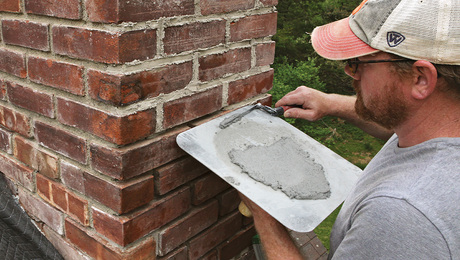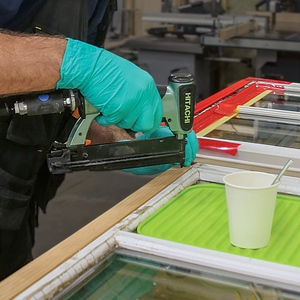*
Discussion Forum
Discussion Forum
Up Next
Video Shorts
Featured Story

Old masonry may look tough, but the wrong mortar can destroy it—here's how to choose the right mix for lasting repairs.
Featured Video
Builder’s Advocate: An Interview With ViewrailHighlights
"I have learned so much thanks to the searchable articles on the FHB website. I can confidently say that I expect to be a life-long subscriber." - M.K.
Fine Homebuilding Magazine
- Home Group
- Antique Trader
- Arts & Crafts Homes
- Bank Note Reporter
- Cabin Life
- Cuisine at Home
- Fine Gardening
- Fine Woodworking
- Green Building Advisor
- Garden Gate
- Horticulture
- Keep Craft Alive
- Log Home Living
- Military Trader/Vehicles
- Numismatic News
- Numismaster
- Old Cars Weekly
- Old House Journal
- Period Homes
- Popular Woodworking
- Script
- ShopNotes
- Sports Collectors Digest
- Threads
- Timber Home Living
- Traditional Building
- Woodsmith
- World Coin News
- Writer's Digest


















Replies
*
I'm all wound up over this one.
*
thanks barry, we all need to have some spring in our lives!! but seriously, I'm new to this game and forgot to ask my question. can anyone tell me how to adjust the spring tension on this type garage door opener? my garage door requires much more effort to raise than what is described in the literature that came with my new electric opener from sears. i recognize that due to the existing tension on the springs that there is some danger in this procedure, but i am experienced in most areas of home maintenance. thanks in advance for any help
*Hi Ray,If it were me I would pay the small cost of having a professional garage door installer come to my house to make the necessary adjustments. I knew a guy who tried this without experience and ended up with BOTH hand ripped to shreds from doing it wrong. There art lots of home improvements that anyone can do but his is one I wouldn't tackle. Best of Luck. SteveM
*
Steve and Ray,
Steve's somewhat gruesome advice is pretty sound. There's a new torsion spring system out that uses a ratchet handle for adjustment, but the rest of them are kind of manual. I'd probably work under my car with only an old Chevy jack holding it up before I'd play with torsion springs.
Before calling the pro, make sure that everything else is in good working order. Check the rollers for operation and too much grease or dirt. Clean the tracks, also. Most are over lubricated and dirty. Tighten or replace any track hardware that may have loosened or fallen off. Is the travel resistance consistent, or only in spots? If the latter, it probably isn't the spring, but binding in the track. This can happen a lot at the bottom where the track can get banged out of alignment.
*Barry's last post is right on. I am going to shout now, so you understand the importance of this. DO NOT ATTEMPT TO ADJUST THE SPRINGS IF YOU DO NOT HAVE EXPERIENCE IN THIS.Whew, did you get that? Don't make me come over there. Seriously, most garage door companies will send a guy out for no charge to you, or a very nominal fee. I have installed quite a few doors and can tell you that fooling with torsion springs is not the time or place to "learn as you go". Do not even consider doing this yourself.
*Ray, In addition to all the other good advice you got, you should check to make sure that you don't have a broken spring if you have a two-spring system. Also, look on the outside end of the spring and see if the retainer (has two bolts gripping the axle shaft) may have spun and taken tension off of the spring.These are very dangerous and I think it's good advice to seek help. I put in a lot of these. If you absolutely can't get anyone to help you, write back and I'll tell you how to do it without killing yourself...
*G. LaLonde, may I have a word with you? Actually, I want to take you to task re: your post. First, let me ask you this: are you familiar with the difficult nature of giving a quote, trouble-shooting, or giving explicit directions sight unseen over the telephone? I mean, you've gone through this before, right? (Before I really get started, let me congratulate you for your desire to be of help, and to offer expert advice.)Think of what you are proposing; you offer to give expert advice to a person whose skill level you do not know. This doesn't call into question the actual person seeking advice, it is the nature of the situation which concerns me. You may have already assumed that this person even has a basic understanding of overhead garage doors. For example, you said he should check the spring retainer and to check for a broken spring. How will he do this, count the "wraps"? Maybe he doesn't know how. But, you have invited him to go to his door and start probing.I realise I'm treading on thin ice, possibly insulting you, for example, but I cannot allow my responsibility(we all share this responsibility) to ensure the safety of others go unheeded.Think of it another way: would you, if you were an electrician, attempt to advise a person how to wire a hot receptacle? Over the phone? I guess I have been around long enough to have learned that sometimes even the simplest tasks can be overwhelming to the uninitiated. Also, our words are sometimes ambiguous, because we, the expert, are not cognizant of the fact that the layperson often does not have the basic understanding which we take for granted.The thought of Ray banging away at his keyboard one handed--'cause the other hand has been mangled by a torsion spring--makes me shudder. What happens when one of the winder bars flies into the windshield of the wife's car?Lastly, should we feel liable for not only the advice we give, but also to whom we give it? I know case law in CA has precedent after precedent establishing liability with the expert. It is our duty to not only verify the quality of our advice, but to know to whom we give it. I don't meant to be a sick in the mud, actually I want to encourage you to speak up about that which you know. Just know it can be very difficult to explain in sufficent detail all the steps another must understand. In this case, safety is the main concern.
*
Rich,
I'm sure your intentions are good, but I have to disagree with you. The reason I like this board is because there is real information from people who actually know what they're talking about. Anyone who gets advice MUST be responsible for there own actions. It's just advice. If we force the discussion to the lowest possible level, then what's the point? The answer to every question will be "go hire an expert". Respectfully, John.
*Rich, your point is well taken. I thought about this after responding and decided to have him call me if he wanted to and we could discuss this! The other side of the coin is...maybe he actually can't find anyone to help him. So what's worse, deciding to try and do it himself without any advice or talking with me and finding out how to do it safely?The two items I suggested he check are certainly easy to see. You can stand on a stepladder and see those problems. The spring is not going to jump out and bite you!I would be the first to agree that he should not touch this if he doesn't feel comfortable with the job. Some people are unfamiliar with how things work but are very capable of doing a job like this. Anyway, I appreciate your comments and take them to heart. By the way, did you read the recent topic about how to temporarily hot wire a new electric drop?? Do you also see this in the same light?
*
G. LaLonde, I agree that it is better to seek out qualified advice than to go it alone. But, I still have a lingering feeling that a layperson given the right information can still get it wrong.
Perhaps I overemphasized my point, of course the spring won't jump out at him. However, I can see it quite clearly; one thing leads to another, before you know it, the guy is meddling were he doesn't belong. This is when he overtightens the retainer bolts or attempts some adjustment. People are like that.
I myself do give freely of my knowledge, but the caveat resides in me. That is, I decide where the limit is, not the other person.(How can you rightfully expect the layperson to know when he is getting over his head?) You give a guy a little information and he expands upon that, not fully understanding the "whys & hows".
Yes, I did read about the new electrical drop. I don't think this is like that though. I got the idea that was tradesman talking to tradesman. Here, you are talking to a layman. My point in bring up the electrical analogy was to compare the potential danger of a "hot" circuit and a "hot" spring.
Concerning John K's post: I agree this forum is stupendous for discussion. Yet, I reiterate; the right information in the wrong hands can be an invitation for disaster. Regardless of what we think, the law says otherwise, we--those that call the construction industry our occupation--must take care in knowing to whom we give advice.
Perhaps an electronic forum such as this falls in the realm of banter, thereby outside the usual situation. If so, then we should continue. But this is not a trade forum for their are laypersons here also. Does "hiring an expert" revolve just around money paid, money recieved? People are here for advice, that very same advice they would otherwise pay for. Nonetheless, we are still the experts to be held accountable.
I'm a tile contractor. I often give advice to others pertinent to my normal scope of work. But I must control the exchange of information. I assume complete liability when I suggest to others an installation method or material for use. Tile is not usually very hazardous, but some situations do arise where I need to speak very precisely.
Manifest also is my responsibilty to ascertain the ability to comprehend this information on the part of the receiver of my information. I'm the so called "expert", who when giving information to the "layperson" assumes liability.
Rambling yours,
Rich
*